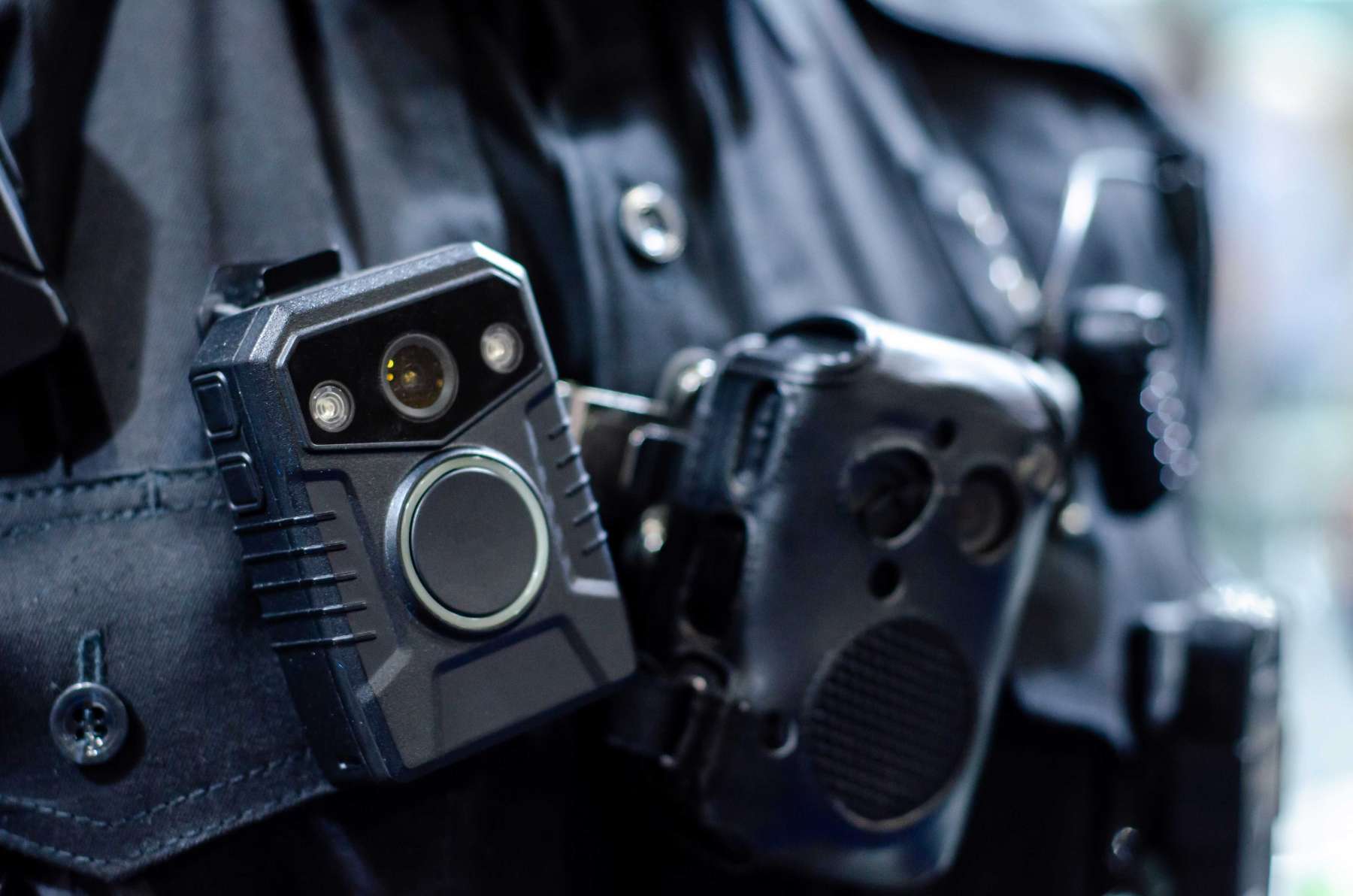All police departments statewide to utilize body-worn cameras, except one
Under the program, which Attorney General Peter Neronha said will be rolling out over the next weeks and months across Rhode Island, state and municipal police departments applied for grant funding to cover the projected cost of a camera and related hardware, software, and storage, and an agency’s significant administrative costs in operating body-worn cameras.
October 13, 2022, 12:04 pm
By Steve Ahlquist
The Office of the Attorney General, the Rhode Island Department of Public Safety, the Rhode Island Police Chiefs’ Association (RIPCA), Rhode Island’s Congressional Delegation, and state legislative leaders announced $16 million in grant awards for 42 local and state law enforcement agencies to equip approximately 1,773 frontline police officers, nearly every police officer in the state, with body-worn cameras at a press conference on Wednesday.
Every city and town in Rhode Island has availed themselves of the new program, except Smithfield. Exeter does not have a police department. State law enforcement agencies such as the Airport Corporation, Department of Environmental Managment, Rhode Island College, Rhode Island State Police and the University of Rhode Island are also entering the program. Attorney General Neronha noted that Smithfield is always welcome to join the program in the future. The full list of body-worn camera grant awards announced by the Department of Public Safety is available here.
Under the program, which Attorney General Peter Neronha said will be rolling out over the next weeks and months across Rhode Island, state and municipal police departments applied for grant funding to cover the projected cost of a camera and related hardware, software, and storage, and an agency’s significant administrative costs in operating body-worn cameras. All funding is to be used to operate body-worn cameras over a five-year period and awarded funds will only be distributed on a reimbursement basis, safeguarding taxpayer dollars.
Under the Statewide Body-Worn Camera law, police departments receiving funds through the Program must certify that they have adopted the Statewide Body-Worn Camera Policy issued by the Attorney General’s Office and the Department of Public Safety before any awarded grant funds will be disbursed. This requirement is to ensure that police departments statewide adopt model policies that protect constitutional rights, document critical interactions between law enforcement and members of the public, promote transparency, and build public trust in government. However, critics argue that the policy does not go far enough.
“As important as the deployment of body-worn cameras to law enforcement officers in Rhode Island is to ensuring oversight and transparency in policing practices, that transparency and oversight is only as meaningful as the public’s ability to access the critical footage and information that is collected by this technology,” wrote ACCESS/Rhode Island. “While the policy deployed by the Department of Public Safety and the Attorney General’s office puts in place a structure for these cameras, it remains deficient in strong standards which would provide for timely release of footage relating to incidents that the public should have quick access to, including in situations where there has been serious use of force.”
ACCESS/Rhode Island is a coalition of non-profit organizations working to ensure the work of our government is transparent that includes the ACLU of Rhode Island, Common Cause Rhode Island, the League of Women Voters of Rhode Island, the Rhode Island Press Association, and the New England First Amendment Coalition.
“Currently, the policy only provides a vague and imprecise expected timeframe for release of such footage and does not encourage prompt release,” continued ACCESS/Rhode Island in their statement. “Attorney General Neronha appropriately noted (in a news conference yesterday afternoon announcing the awarding of grants to police departments for the use of body cameras) that the public expects to see what is happening on the streets. For this to happen, robust standards for release to the public of high-interest or highly publicized incidents must be put in place. Otherwise, this program does not provide accountability and transparency in the manner which it has been put in place to do so.“
“Today is good day for all Rhode Islanders, as we equip front-line police officers across the state with a helpful tool that will benefit them and the public by assisting critical fact finding and building community trust,” said Attorney General Neronha. “In an increasingly technological age, where judges, juries and the public expect to see the evidence on which they are to make decisions and render judgments, making body-worn cameras broadly available makes perfect sense. With today’s funding announcement, we have removed a substantial monetary barrier for many municipalities that continuously juggle critical priorities. This has been a collective effort, and I am grateful to everyone, including leaders in the General Assembly, the Governor, members of law enforcement, and our Congressional Delegation who have made today possible.”
In June 2021, Governor Daniel McKee signed legislation creating the Statewide Body-Worn Camera Program to equip every frontline police officer with body-worn cameras. The Attorney General and Department of Public Safety, in consultation with the Rhode Island Police Chiefs Association, were tasked with implementing the program, including promulgating rules and regulations to create statewide policy and eventually administer funding for departments to deploy body-worn cameras to officers.
In December 2021, Rhode Island’s Congressional Delegation secured a $1.5 million Department of Justice grant to supplement state funding for the program.
State Senator Tiara Mack (Democrat, District 6, Providence) took to Twitter to argue that body-cameras will do little to make communities safer or increase police accountability because of the Law Enforcement Officer’s Bill of Rights (LEOBoR). Senator Mack continued her call for the repeal of the statute.
“Outfitting our Troopers and members of law enforcement with body-worn cameras is a key milestone as we work to address the issues that are challenges in policing today,” said Colonel Darnell Weaver, Superintendent of the Rhode Island State Police and Director of the Department of Public Safety. “Cameras will add transparency, provide accountability, and give a point-of-view perspective – to every police contact. I expect that cameras will foster greater trust between citizens and their police departments, helping to lower complaints and improve relationships. These cameras will substantially improve the quality of evidence we collect and conduct investigations more efficiently.”
“The Rhode Island Police Chiefs’ Association is proud to support the use of body-worn cameras,” said Sean Corrigan, RIPCA President and Narragansett Police Chief. “We appreciate not only the immense value they provide in transparency, but also the opportunity to reach truthful resolutions and promote greater public trust. One of the key components of our Twenty for 2020 campaign was a pledge for every department in the state to research the feasibility and oversee the implementation of body-worn cameras. We are grateful to the stakeholders involved in the process and look forward to these cameras on our officers and in our streets.”
“This is about keeping people safe and serving justice. I am committed to ensuring our police officers have the tools and technology they need to enhance public safety. These evidence-capturing devices are part of that effort. They build trust with the community by ensuring transparency while aiding law enforcement with criminal investigations and prosecutions,” said Senator Jack Reed.
“The last few years have shown us how vital it is to foster relationships between our communities and police departments – and to equip our law enforcement with the tools they need to function efficiently and safely while also maintaining transparency and accountability,” said Representative David Cicilline. “Unfortunately, many law enforcement agencies across the country can’t afford to provide body cameras to their officers. Thankfully, Rhode Island has taken steps to address that problem by establishing the Statewide Body-Worn Camera Program. I was proud to work with my colleagues in the delegation to secure federal funding supporting this initiative and want to thank all the local leaders who are working to implement this public safety program.”
“Getting this funding to our local police departments will have a swift impact on reform, transparency and the establishment of meaningful, effective oversight, as well as improving the relationship between law enforcement and the communities they serve. Every camera worn by an officer has the potential to defend justice and truth, and ultimately helps create the safer neighborhoods we all seek,” said Senator Jonathan Acosta.
“Body-worn cameras are one concrete way to make our criminal justice system more just. The biggest hurdle to acquiring BWCs across the state, for too long, has been funding. I am proud to work with state leaders to make that funding available and I look forward to continuing to work with state leaders to improve Rhode Islanders confidence in public safety,” said Representative José Batista.
“In June 2021, I participated in the announcement of the Statewide Body-Worn Camera Program, and I am pleased to see how far the initiative has come – from a policy idea to a program with guidelines, and soon the purchasing of cameras. These cameras can and will dramatically improve fact-finding in law enforcement investigations, and ultimately build stronger trust within our communities,” said Jim Vincent, President of the NAACP Providence Chapter. “I applaud the legislative officials who made this funding a reality, the Office of the Attorney General for their work on the rules surrounding these cameras, the Rhode Island State Police in the issuing these important grants, our Chiefs from communities for their enthusiasm in embracing this program, and our federal delegation for always efficiently supporting our communities with federal resources.”







